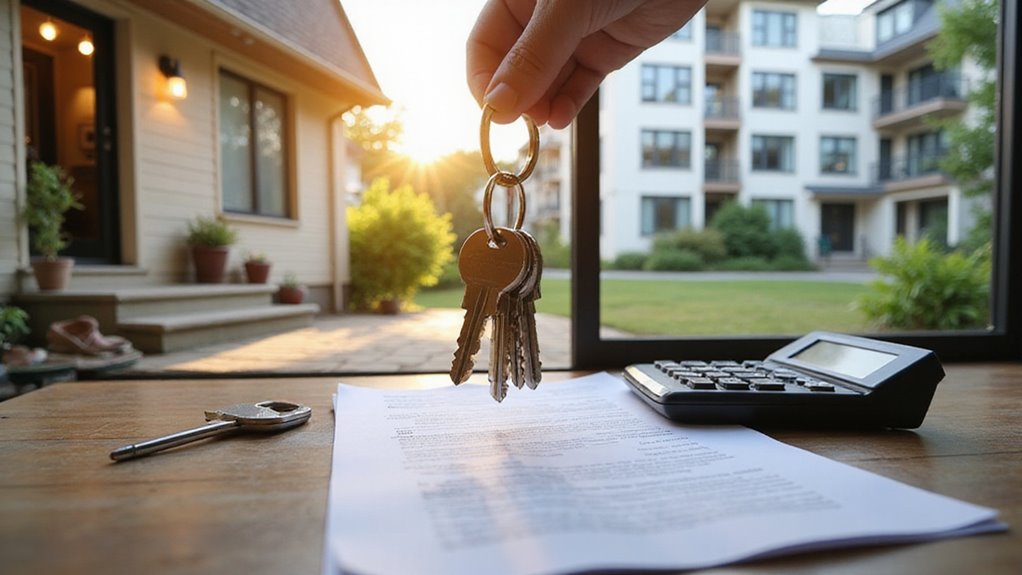
Table of Contents
Selling a rental property is not the same as selling your primary home. Many owners do not realize these differences until too late. Not knowing the rules can cost you money and time.
You might face complicated tax issues, such as capital gains and depreciation recapture. Managing tenant move-outs or handling IRS paperwork can add stress and confusion. Missing key steps may lead to lost profits or penalties.
The main difference is that selling a rental property usually involves more taxes and fewer exemptions than selling your primary residence. You need to know these rules to make the best choice.
Planning ahead can protect your money and peace of mind. This blog will break down these differences and show you how to avoid costly mistakes.
Key Takeaways
- Capital gains tax exclusions often apply to primary residences but not to rental properties, making rental sales subject to higher tax liabilities.
- Selling a rental property requires handling existing leases, tenant notifications, and potential lease transfers, unlike most primary residence sales.
- Depreciation recapture taxes apply when selling rentals, increasing taxable gains, while primary residences are not subject to this rule.
- 1031 exchanges allow tax deferral for rental property sales if reinvested in similar investments, but this benefit does not apply to primary homes.
- Both types of sales involve agent commissions and closing costs, but rental property sales generally require additional legal and administrative steps.
Capital Gains Tax Differences

When you sell a property, capital gains tax rules depend on the property type. Selling your main home may let you avoid some taxes. The IRS allows you to exclude up to $250,000 of gain, or $500,000 if married filing jointly.
If the property was a rental, these tax breaks do not apply. You must pay capital gains tax on all profits when selling a rental. Careful calculation of your property’s adjusted basis is important. Working with a local buyer who provides creative solutions may help you manage the tax implications when selling your rental property.
The sale of any property can affect your estate’s taxes. It may also impact your heirs’ tax situation if they inherit the property. Good planning can help reduce taxes for you and your family.
If you are tired of being a landlord, selling your rental property can be quick and straightforward by working with a local expert.
Depreciation Recapture Rules
Depreciation recapture is a special tax rule that applies when you sell rental property. If you claimed depreciation deductions on your rental, the IRS will tax those deductions when you sell. The recapture tax rate can be as high as 25%.
Your adjusted basis in the property is your original cost plus improvements, minus any depreciation you took. The IRS uses this adjusted basis to figure out your gain and the recapture amount. If you did not claim depreciation, this rule does not apply. Local sellers may benefit from knowing about no-obligation cash offers that can help simplify the selling process, especially when dealing with complex tax rules.
Depreciation recapture does not affect primary residences. The IRS applies other rules, like the home sale exclusion, to your main home. Rental properties, on the other hand, have more complex tax steps.
If you plan to sell a rental property, you should expect extra taxes from depreciation recapture. This tax is different from capital gains tax. Proper records help you calculate the correct amount.
If you’re feeling overwhelmed by these rules, consider reaching out to a local property buyer who offers unique and creative solutions to selling houses, which can help make the process less stressful.
Eligibility for Exclusion of Gains

You must satisfy specific ownership and use criteria to qualify for the capital gains exclusion on a primary residence. Rental properties generally don’t meet these requirements, limiting your access to exclusion benefits. However, you may still obtain a partial exclusion under certain circumstances, such as unforeseen life events.
For those facing delinquent property taxes or other challenging situations, there are unique and creative solutions available to help you sell your property quickly. If you want to avoid the hassle of listing the house, a direct cash offer may be a faster and simpler option.
Primary Residence Ownership Requirements
To qualify for the capital gains exclusion on your home, you must follow certain IRS rules. You must own the property for at least two of the last five years. You also need to live in the home as your main residence for two years within that period.
The years you own and live in the home do not need to be the same. If you used the home as a rental before, check the lease terms. You must end leases properly and respect tenant rights to claim the home as your main residence.
If you do not meet these requirements, you may not qualify for the exclusion. Always review your situation before selling your home. This will help you avoid issues with your capital gains taxes.
Rental Property Exclusion Limits
The IRS does not let you use the main home exclusion when selling a rental property. You cannot claim the $250,000 ($500,000 for married couples) capital gains exclusion if the property was only used for rental income.
You must both own and live in the property as your main home for two out of the five years before selling. If you did not live in the property, you do not qualify for the exclusion.
Any profit you make from selling the rental is taxed as a capital gain. You might also have to pay extra taxes on depreciation you claimed while renting the property.
Partial Exclusion Circumstances
Sometimes, you can get a partial capital gains exclusion if you sell your home early. The IRS allows this if you move for a job, health reasons, or other approved hardships. You do not need to meet the two-year rule if you qualify for this exception.
You must show proof of your reason and how long you lived in the home. The exclusion is based on the time you lived there. For example, if you lived there one year, you may exclude half the usual amount.
Tax rules are strict, so you need to calculate the allowed exclusion carefully. If you are unsure, ask a tax advisor. They can help you follow IRS rules and reduce your tax bill.
Impact of 1031 Exchanges

A 1031 exchange lets you defer taxes when selling investment property. You cannot use a 1031 exchange with your primary home. Only rental or business properties qualify for this tax benefit.
If you use a 1031 exchange, you must buy a similar investment property. This process postpones capital gains taxes and helps you grow your investments. It does not apply to homes you live in. For those in Norman, unique and creative solution services may be available when selling rental properties.
For a primary residence, Section 121 of the IRS code may shield some profit from taxes. However, you cannot defer all gains or reinvest like a 1031 exchange allows. Your options for tax savings are more limited.
Consider these differences before selling your property. If you plan to sell a rental, a 1031 exchange can save you money. Selling a primary home offers fewer tax benefits and less flexibility.
When selling a rental property, you may also benefit from a hassle-free transaction if you work with a cash buyer, making the process quicker and more efficient.
Sell My Oklahoma House Fast For Cash Now
Dealing With Tenants During the Sale
When selling a rental property, you must comply with statutory requirements for tenant notification, ensuring all communications are legally sound. You’ll need to coordinate property showings with minimal disruption, respecting tenant rights and privacy. It’s also critical to address existing lease agreements, as these contracts can significantly impact transaction terms and buyer interest.
If you’re dealing with horrible tenants or landlord fatigue, you may benefit from a unique and creative solution to selling your house quickly, regardless of the situation. In certain cases, working with a local house buyer who specializes in handling challenging circumstances—such as foreclosure, liens, or delinquent property taxes—can make the process smoother and less stressful for landlords.
Notifying Tenants Legally
You must notify tenants before listing your rental property for sale. Most areas require written notice within a set timeframe. Check local laws and your lease for exact rules.
A fixed-term lease often allows tenants to stay until their lease ends. Month-to-month leases usually need less notice. Always follow the rules for your situation.
If you do not notify tenants properly, legal trouble may follow. Delays in the sale are also possible. Written documentation protects you and keeps things professional.
Clear communication helps keep a good relationship with tenants. If you are unsure, review local laws or ask a lawyer. Proper notice benefits everyone involved.
Scheduling Showings Respectfully
Tenant cooperation is key to smooth property showings. Show respect for tenants by giving advance notice and following the law. Always try to schedule showings at times that work for tenants.
Clear communication with tenants helps avoid misunderstandings. Property owners should ask tenants to keep spaces clean and tidy. Owners must also respect tenants’ privacy at all times.
If tenants find in-person showings hard, consider using virtual tours. Virtual tours reduce disruptions and help reach more potential buyers. These steps show respect for tenants and attract serious buyers.
Using these strategies will help sell the property faster. A respectful approach makes the process easier for everyone. This also makes the property more appealing on the market.
Handling Lease Agreements
When selling a property with tenants, you must follow existing lease agreements. These agreements stay valid even after the sale. If you ignore them, you could face legal and financial consequences.
Fixed-term leases continue under the new owner. Month-to-month leases may allow for more flexibility if both parties agree. Always read the lease terms before making decisions.
You should communicate clearly with tenants about the sale and any possible changes. Tenants have a right to know about showings, new ownership, and their future in the property. If you fail to inform them, you risk problems and delays.
Sellers may face challenges like delayed closings, limited showings, or lower offers. Tenants might worry about losing their home or unexpected changes. Local laws protect tenants, so make sure you understand them before proceeding.
Timing and Market Considerations
When deciding when to sell a rental property or a primary home, check the current market conditions first. Look at inventory, price trends, interest rates, and local economic health. These factors help you choose the best time to sell.
Investors selling rental properties should watch cap rates and rental yields. If market demand is high or conditions are favorable, it may be a good time to sell. You can get better returns by aligning your sale with these cycles.
Selling a primary residence often depends on personal needs. However, if inventory is low and prices are rising, you could make more profit. Seasonal trends can also change how many buyers are looking.
Using online listings and local networks can boost your property’s visibility. Well-timed and targeted marketing helps attract more buyers. Property staging can also shorten selling time and raise the sale price.
If you need to sell your house fast, services like Shawn Buys Houses offer unique solutions and can provide a cash offer in as little as 20 minutes, making timing considerations even more flexible.
Property Preparation and Staging

Property preparation and staging help make your home look its best for buyers. Good preparation can increase your chances of a quick, profitable sale.
Start by cleaning the inside and outside of the property. If the home is a rental, use neutral colors and simple décor to appeal to more buyers. A primary residence can use some personal touches if they make the space feel comfortable.
Clean thoroughly inside and out; use neutral décor for rentals and add cozy touches for primary homes to attract more buyers.
Curb appeal is important, so keep the yard tidy and the entrance welcoming. Fix any obvious damage or overdue repairs, as buyers notice these details. If needed, use professional staging and small upgrades to show off each room’s purpose and space.
Staging should match what buyers in your market expect. If you follow these steps, you can improve how buyers feel about the property. This increases the chance of selling quickly and at a good price.
Sell My Oklahoma House Fast For Cash Now
Disclosure and Inspection Requirements
You must follow disclosure and inspection rules when selling any property. These rules are different for rental properties and primary homes. Proper compliance helps you avoid legal issues.
Selling a rental property requires more disclosures. You must tell buyers about leases, deposits, and tenant rights. If tenants still live there, you may need to give them notice before showings or inspections.
Selling your main home usually needs only standard property condition disclosures. There are no tenant rights to consider if you live in the home. Always check your state’s requirements for specific forms.
Accurate disclosure forms and inspection reports protect you from legal problems. If you hide facts or ignore tenant rights, you could face lawsuits or delayed sales. Complete all paperwork carefully to reduce your risks.
Marketing Strategies for Each Property Type

When marketing a rental property, you should prioritize showcasing its income-generating capability, tenant stability, and cap rate to attract investors. In contrast, you’ll want to emphasize lifestyle features, curb appeal, and neighborhood amenities when selling a primary residence to prospective homeowners. Tailoring your messaging to each target audience increases buyer engagement and optimizes your sale outcome.
Highlighting Investment Potential
Strategically highlighting your property’s investment potential can help increase its value. Investors want to see clear financial benefits before they buy. If you present the right information, you can attract serious buyers.
Rental properties appeal more when you show strong cash flow. You should share past rental income and steady occupancy rates. These details help prove tenant demand.
Upgrades and recent maintenance can lower future expenses for new owners. If you have made improvements, include them in your marketing. This shows buyers the property is well cared for.
Neighborhood growth can also increase property value. Highlight new developments, rising prices, or low vacancy rates in the area. Buyers may pay more if they expect the area to improve.
Emphasizing Home Lifestyle
Buyers looking for a primary home care most about lifestyle and comfort. They want features that make daily life enjoyable and convenient. If a home offers these, buyers often feel more connected to the property.
Home decor trends and smart layouts can quickly attract attention. A home with open spaces feels welcoming and perfect for gatherings. Modern touches show the home is ready for move-in.
Neighborhood extras, like parks and good schools, add strong value. If a home is near shops or restaurants, it becomes even more appealing. Staging can help buyers imagine their lives in the space.
Marketing materials should show these lifestyle benefits clearly. Photos and descriptions must highlight what makes the home special. If buyers can picture themselves living there, they are more likely to make an offer.
| Feature | Lifestyle Appeal Example |
|---|---|
| Open-Concept Layout | Entertain guests with ease |
| Modern Home Decor | Move-in ready, stylish interiors |
| Proximity to Parks | Family recreation steps away |
| Vibrant Neighborhood | Cafés and shops within walking reach |
Closing Costs and Fees
Closing costs and fees are different for a rental property compared to a primary residence. Selling a primary home usually focuses on buyer incentives and making the house look appealing. Rental property sales often involve extra paperwork because of tenants and leases.
Both types of sales require agent commissions and title insurance. Rental property sales need added documents for tenant agreements. Buyers may also ask for repair credits if the rental has maintenance issues.
Transfer taxes apply to both property types. Escrow for rentals can be more complex if leases are in place. If tenants remain, sellers must handle lease transfers and legal details.
State and Local Tax Implications
You’ll encounter significant differences in state and local capital gains tax treatment when selling a rental property compared to a primary residence. Many jurisdictions also impose depreciation recapture rules, which can increase your taxable gain on rental sales. Understanding these variables is essential for accurate tax planning and compliance.
Capital Gains Tax Differences
Capital gains tax is different for rental properties and primary homes. Selling a primary residence may let you exclude some gains from federal tax. Rental properties do not qualify for this exclusion.
If you meet certain conditions, you can exclude up to $250,000 ($500,000 for couples) of gain on a primary home. Rental property sales are fully taxable and require different tax planning.
Some states add extra taxes when you sell a rental property. These state taxes lower your final profit from the sale.
Inherited properties get a new tax basis, which can lower future capital gains tax. Both primary homes and rentals benefit from this rule. Careful planning helps you reduce taxes when selling any property.
Depreciation Recapture Rules
Depreciation recapture happens when you sell a rental property and have claimed depreciation on it. The IRS taxes the amount you depreciated at a special rate, up to 25%. This rule is different from regular capital gains tax.
Many states also have their own depreciation recapture tax. You must check both federal and state taxes before selling. If the property was your main home and never rented, depreciation recapture usually does not apply.
If you rented out your primary home at any point, you may owe recapture tax. You can use strategies like a 1031 exchange to delay paying this tax. Planning ahead helps you manage your taxes when selling.
Emotional Considerations and Attachments
Emotional considerations can affect your decision to sell a property. If you are attached to your home, selling can be difficult. Memories and feelings often make the process more complex. Strong emotional ties to your home can make selling it a more challenging and complex decision.
Selling your main home can feel personal because of family events and routines. Letting go might be hard if you have strong memories there. These attachments can slow your decision-making.
If you are selling a rental property, emotions usually play a smaller role. Most people see rental units as investments. You will likely focus on price and profits.
Understanding these differences helps you stay objective. If you know your feelings, you can choose a better selling strategy. Clear reasoning supports good decisions.
Financing Options for Buyers
Financing options differ based on whether a buyer wants a primary residence or a rental property. Lenders usually offer better terms for primary homes. These can include lower down payments and interest rates.
Rental property loans have stricter requirements. Lenders may ask for higher down payments, often between 20% and 25%. Interest rates for these loans are usually higher.
Buyers of rental properties need strong credit and a good debt-to-income ratio. If an investor plans to buy, they may use rental income to help qualify. Many investors look for stable cash flow and long-term value.
As a seller, knowing these differences can help you target the right buyers. If you focus on investors, highlight the property’s income potential. For primary home buyers, emphasize affordability and financing options.
Reporting Requirements to the IRS
When you sell any property, you must report it to the IRS. Your reporting steps depend on whether it is your home or a rental property. The IRS uses your information to calculate your taxes on the sale.
Selling property requires reporting it to the IRS, with different steps for homes versus rentals, to determine the correct taxes on your sale.
Sellers need to fill out Form 8949 and Schedule D. These forms show your gain or loss from the sale. You must include these with your tax return.
If you sell a rental property, more rules apply. You must report any depreciation you claimed during ownership. Depreciation recapture can increase your taxes owed.
Form 1099-S is usually given to you by the closing agent. This form reports the sale proceeds to the IRS. You should keep this form for your records.
Remember to keep all documents related to the sale. Good records help you file your return correctly and avoid IRS issues. If you are unsure, consider asking a tax professional for help.
Conclusion
If you are deciding between selling a rental property or your primary home, you must consider the different rules and tax impacts. Selling a rental property often means facing more taxes and dealing with tenants or leases. If you sell your primary residence, you may qualify for valuable tax exclusions and a simpler process.
When you overlook these differences, you might end up with unexpected costs or legal issues. If you want a faster, easier sale, we buy houses for cash regardless of the situation. Choosing this route can help you avoid many of the complications that come with traditional sales.
If you are ready to sell, we at Shawn Buys Houses can guide you through each step. We offer fair cash offers and handle all the details for you. Contact us today to see how we can help with your property sale.
